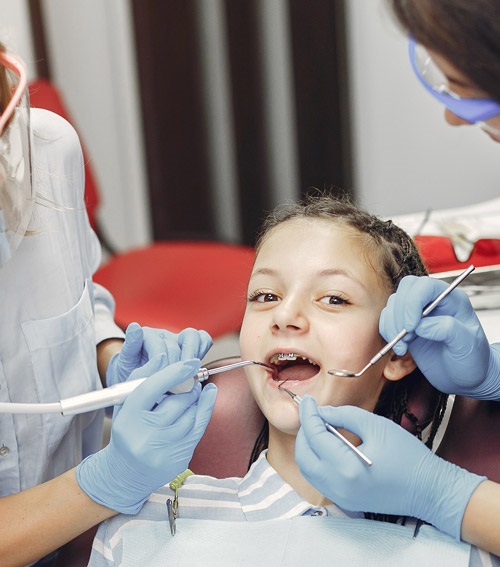 PEDIATRIC DENTISTRY
PEDIATRIC DENTISTRY
When Should I Take My Child to the Dentist?
It is recommended that children come to the dentist with their parents when possible. Then, in line with the recommendations of your dentist, he is called for routine controls. In this way, the children are prepared for the sounds, smells and all the formations in the clinic in preparation for their future appointments. The earlier these preparations are made, the more comfortable the child will be.
Child’s First Appointment with the Dentist
You can make your child’s first meeting with the dentist coincide with a special day, such as a birthday. In the first appointment, the necessary conditions for good oral hygiene are explained to the child. Absolutely any procedure that will be painful and uncomfortable for him is avoided. A follow-up appointment is given in a short time and diseases that can be diagnosed early are detected by examining the mouth. Every child should come to the dentist for routine check-ups twice a year. Any caries formation that may develop in this way is intervened early.
Good Habits Last A Lifetime..
Taking care of your child’s teeth in the early period allows them to stick to a lifetime of care and to have a much healthier oral hygiene in adulthood.
Although your child will not have teeth until six months of age, we as dentists recommend that parents gently clean their gums with a soft cloth. We recommend that your baby be brushed immediately by the parents as soon as their first milk teeth emerge. Between 6 and 12 months, the child needs to acquire a little brushing habit. Your baby’s teeth and gums should be brushed gently with a soft clean cloth or soft toothbrush, without paste. Toothpaste is not recommended until the age of two. After the age of two, it should be brushed with a pea-sized amount of fluoride toothpaste under the supervision of parents. It is ideal to brush twice a day after breakfast and before going to bed. You can make it feel like a playtime with your child. Children under the age of 6 need help brushing their teeth. Brushing the teeth for 2-3 minutes should be shown to the child by the parents. As dentists, we are ready to help parents and most importantly your child in this regard. When the first teeth erupt, you can brush their teeth with a toothbrush specially produced for children. Your child should brush their teeth under your supervision until at least 7 years old. After all the teeth have been erupted, it should be tried to brush the teeth with circular movements by focusing on a single area with the help of a small-headed toothbrush. It should not be forgotten that every surface of the teeth and gums should be brushed. Tooth brushing should be made into a routine and teeth should be brushed twice a day every morning and evening before going to bed. We should try to encourage your child in this area, and we should not forget to praise him while brushing his teeth.
Tooth decay
It is a disease caused by specific bacteria or germs living in the mouth. The damage starts as white or brown spot stains and over time, the enamel layer of the tooth is broken and a gap is formed. Once a cavity is formed, the progression of the caries accelerates. The reason for this is that the underlying layer is softer than the enamel layer and the cleaning of the area becomes more difficult. Most caries occur on the chewing surfaces of posterior molars. Because in these regions, there are many indentations and food gets stuck in these indentations.
In children, 80% of dental caries occurs on the chewing surfaces of the teeth. These surfaces can be protected with fissure sealants. Fissure sealant is a white fluid layer applied to the chewing surfaces of molars. It penetrates into the recesses on the surface and creates a shallow, flat surface. Although fissure sealants are recommended for primary teeth, they are mostly applied to the first permanent molars that erupt at the age of six or seven years.
How Can I Prevent Tooth Decay in My Child?
The more sugary or acidic foods and drinks your child consumes, the more prone to tooth decay. Therefore, it should be avoided as much as possible from sugary and acidic foods. If you want to give your child snacks, try cheese, vegetables or fruit. Try to keep away from dried fruits as they stick to the surface of the teeth and are high in sugar. Another important thing to remember is that some baby foods have a high sugar content. Food ingredients must be strictly controlled. In some cases, sugars are written fructose, glucose, lactose, and sucrose. If the teeth are brushed for two minutes twice a day, in the morning and evening, the formation of caries is prevented as much as possible.
What Kind of Toothbrush Should Children Use?
There are many different types of brushes, such as colored toothbrushes, color changing toothbrushes, toothbrushes with a picture of your child’s favorite character on the handle, and timer toothbrushes. All these brushes encourage the child to brush their teeth. The important point is to use small-headed soft toothbrushes.

